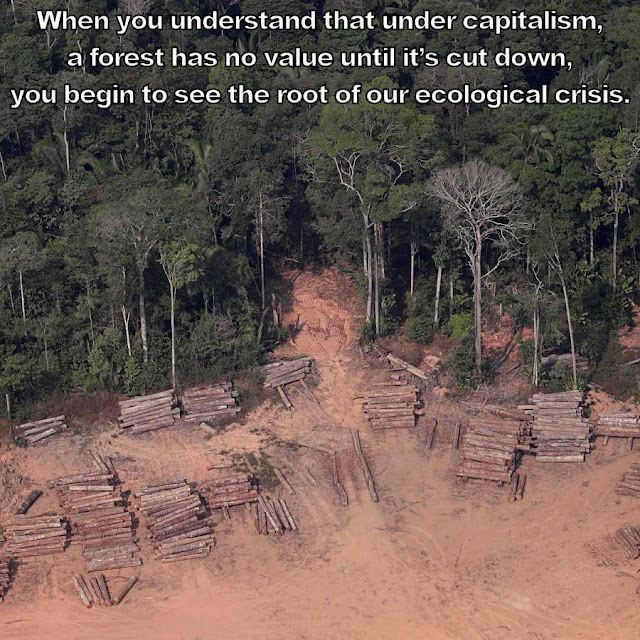So far, only a very few activists at COP26 here in Glasgow fully understand the need for socialism, as an alternative society where there will be no private property, no classes, and no state. Despite the indignation and anger evident at all the gatherings, the real opposition to capitalism has yet to be born. It will take shape in the workplace and in the street, in colleges and in communities. Capitalism has outlived its usefulness, but it won't just fade away of its own accord. It needs to be abolished. We are the majority of the population and we are endowed with eloquent spokespersons and capable organisers, but we don't exercise any real power – so we are ignored. Yet every day brings a clash between most people's interests and those of the few who possess the power.
Today, we produce more food than ever before, yet many people around the world go without it. The rot at the core of the modern food system is capitalism where food and land are regarded purely as commodities in a global system of profit. But we have the potential within our lifetime to put an end to food, water and energy shortages; to bring healthcare, access to education to all and where we can create a world of abundance that can meet the basic needs of every man, woman and child on this planet.
Millions are turning away in disgust from the social and political status quo but, so far, only a tiny fraction of the discontented understand the need for socialism. Unrest is mounting. Every day people are more repelled by the present political, economic, and social order, however, many fall into a cynical disillusionment and see no point joining a party, no point in voting, no point in protesting.
It would be quite wrong, however, to believe that most people are apathetic about politics but when they look for solutions they see them in religion, in nationalist myths and the myriad of single-issue and identity politics. Their protest demands amount to mere appeals, petitioning the ruling class for more sops. Is it no wonder people quickly realise that the demands for reforms make little difference even if achieved and even desert those? All the time they are campaigning for palliatives, they never hear the socialist case, never discuss socialist ideas. The time spent making reformist demands is time not heeding the need for revolutionary change. We need to be positively advocating socialism as a practical possibility and an achievable one. The primary purpose of being a socialist is to raise people’s consciousness and to further social democracy. The organisational structures we are creating today and the means we opt to engage in will reflect the type of society the future will inherit so it is important that we should work out forms of organisation and strategies of mass action that are genuinely participatory and empowering. The question of class/party organisation and the question of class consciousness are inseparable, they are two aspects of the same development.
The 19th century Chartists organised enormous petitions, with millions of signatures. These were ignored. And still, petitions circulate in political campaigns. Huge demonstrations have taken place but they too are ignored. But yet we still march. Protest movements have shown a way of transforming parks into public forums and general assemblies but they too failed when faced with the coercive machinery of the state. This is unpalatable but true.
The World Socialist Movement does not present policies for capitalism's salvation nor offer better capitalism. It isn't just this form of capitalism or that version we oppose, but capitalism itself. It isn't just who profits and by how much they plunder that we oppose, but it is the entire concept of profit, which by the way is always generated from the appropriation of surplus labour extracted from the working class by wage slavery.
William Morris, who was more than just a wallpaper designer and furniture maker, called upon the working class to acquire the "intelligence enough to conceive, courage enough to will, power enough to compel." In Marxist terms, a class ‘for itself’ – a class that is not just passively united in its unions because of its position in production, but that is also politically organised to assert its interests against the ruling class. Socialism is in the interests of, and to be fought for by, the whole proletariat; and will transform the whole of social and economic and political life. Forms of collective actions and organisation must include and involve all sections of the class, and not simply those who happen to be employed and organised at their factory floor or office or store. That is why a political party is required, to encompass the working people as a whole and not just particular parts of them.
The society we of the World Socialist Movement seek is one where everybody would be free to contribute 'according to ability' and to take 'according to need'. Production would be for use, not for profit, and would be rationally planned by mutual agreement. Technology would be employed to reduce and eliminate mindless drudgery, allowing people to develop their creative potential to the full. With no class privilege to defend, the state would no longer be required. Socialism would be a free society.
Capitalism itself surprising has created a supply chain structure from which we can build and integrate. In Britain, most people obtain their food supplies from four or five big firms. The supermarkets are already a model of efficient planning and logistics. However, they have no democratic control and the whole operation is aimed at making maximum profits for shareholders rather than fulfilling the needs of the general welfare; But the mechanism is there, from field to fork, to be adopted and adapted. Socialist society would only need to turn the task of administration and decision-making over to those who participate in the production and distribution process.
Socialist administration is a federation of self-governing collectives largely concerned with their own internal affairs yet collaborating for the purposes that concern all. Marx described it as an “association of free producers”, not any centrally-planned command economy whose roots go back to Prussia’s Otto von Bismarck readily endorsed by Lenin and his Bolsheviks as “state-capitalism”.



No comments:
Post a Comment